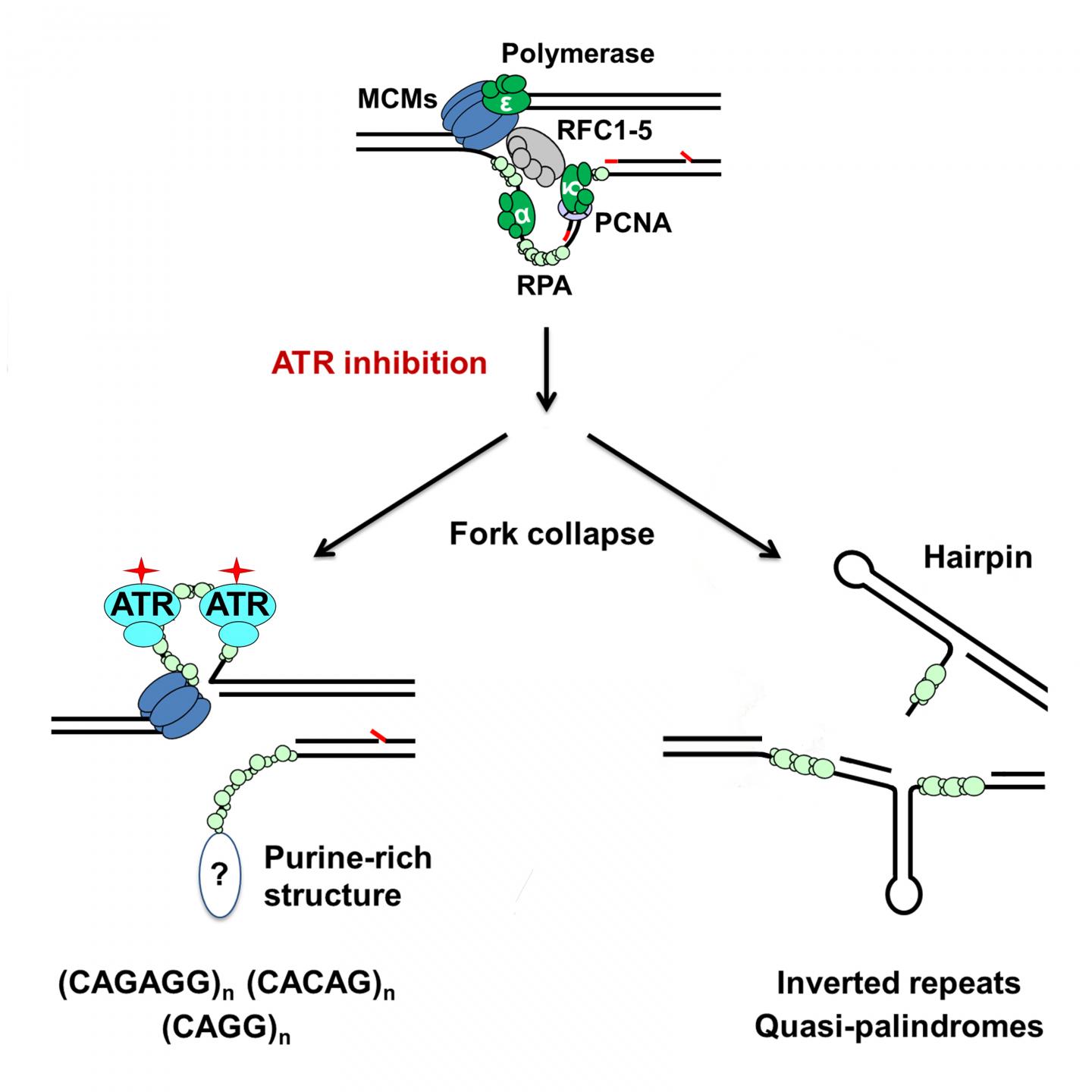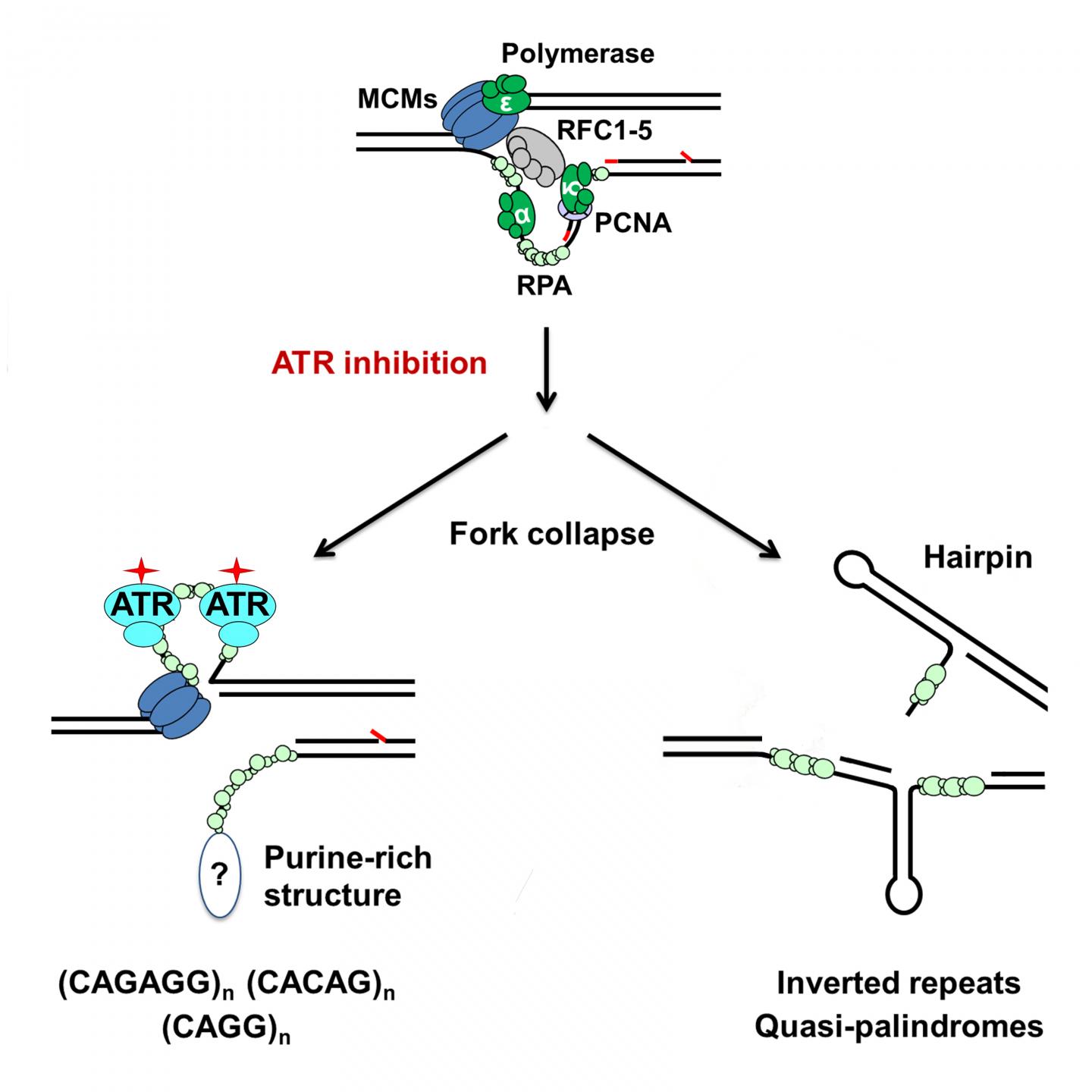
Credit: Eric Brown, PhD, Perelman School of Medicine, University of Pennsylvania
PHILADELPHIA -A twist on the molecular mechanism of how a new cancer drug works could aid in better identifying the best treatments for patients for an array of cancers. The finding is described in Molecular Cell in a study led by Eric J. Brown, PhD, an associate professor of Cancer Biology in the Perelman School of Medicine at the University of Pennsylvania.
Using mouse and human cells, Brown's team, including co-first authors Nishita Shastri and Yu-Chen Tsai, identified over 500 sites in DNA that require an enzyme called ATR checkpoint kinase to not break when they are replicated. These sites are characterized by stretches of repeating DNA building blocks, which impede the normal replication of DNA. The harmful impact of these "genomic potholes" are lessened when the ATR kinase goes to work as a virtual "shock absorber" to smooth over the bumpy parts of replication. Importantly, inhibitors of ATR cause DNA to break, which is key to the anti-cancer effects of this drug.
ATR and PARP enzymes are part of the DNA Damage Response (DDR), which is used by cancer cells to survive high levels of replication stress and defects in DNA repair. Because cancers rely on the DDR for survival, stopping this process with ATR inhibitors is more toxic to cancer cells than normal cells. As such, DDR drugs such as ATR and PARP inhibitors may be more effective than standard therapies.
"Customized clinical use of DDR inhibitors is frequently based on changes in the level or function of specific proteins in cancer cells and this approach aims to improve treatment efficacy," Brown said. "However, it is possible that the effects of ATR inhibitors may not be solely based on lethal interactions with defective gene expression in cancer cells, but also on the state of the repetitive DNA that relies on the ATR enzyme for stability."
ATR inhibitors are in clinical trials for a variety of cancers, including lung, colon, pancreatic, lymphoma, leukemia and others. Penn recently opened a clinical trial, led by Fiona Simpkins, MD, an associate professor of Obstetrics and Gynecology, to investigate the benefit of combining ATR inhibitors with PARP inhibitors for the treatment of recurrent ovarian cancer. "ATR inhibitors may help PARP inhibitors work more effectively during different clinical situations, including overcoming PARP inhibitor resistance," Simpkins said.
"While it is too early to tell exactly how detecting specific DNA sequences that break due to ATR inhibition will be applied in the clinic, the idea that the genome itself, not just the proteins expressed from it, might influence responses to treatment is a novel concept worthy of exploration," Brown said.
The Penn team plans to monitor these sites of repetitive DNA as part of the ATR inhibitor combination clinical trial, which seeks to identify biomarkers that will maximize treatment efficacy.
###
This project was funded by the National Institute of Health (2R01AG027376, 1R01CA189743, 5R25CA101871, T32ES019851, 1R15CA208676), the Basser Center for BRCA Research, the Pennsylvania Department of Health, Center of Excellence in Environmental Toxicology, and the Abramson Family Cancer Research Institute.
Penn Medicine is one of the world's leading academic medical centers, dedicated to the related missions of medical education, biomedical research, and excellence in patient care. Penn Medicine consists of the Raymond and Ruth Perelman School of Medicine at the University of Pennsylvania (founded in 1765 as the nation's first medical school) and the University of Pennsylvania Health System, which together form a $7.8 billion enterprise.
The Perelman School of Medicine has been ranked among the top medical schools in the United States for more than 20 years, according to U.S. News & World Report's survey of research-oriented medical schools. The School is consistently among the nation's top recipients of funding from the National Institutes of Health, with $405 million awarded in the 2017 fiscal year.
The University of Pennsylvania Health System's patient care facilities include: The Hospital of the University of Pennsylvania and Penn Presbyterian Medical Center — which are recognized as one of the nation's top "Honor Roll" hospitals by U.S. News & World Report — Chester County Hospital; Lancaster General Health; Penn Medicine Princeton Health; Penn Wissahickon Hospice; and Pennsylvania Hospital – the nation's first hospital, founded in 1751. Additional affiliated inpatient care facilities and services throughout the Philadelphia region include Good Shepherd Penn Partners, a partnership between Good Shepherd Rehabilitation Network and Penn Medicine, and Princeton House Behavioral Health, a leading provider of highly skilled and compassionate behavioral healthcare.
Penn Medicine is committed to improving lives and health through a variety of community-based programs and activities. In fiscal year 2017, Penn Medicine provided $500 million to benefit our community.
Media Contact
Karen Kreeger
[email protected]
215-459-0544
@PennMedNews
http://www.uphs.upenn.edu/news/





